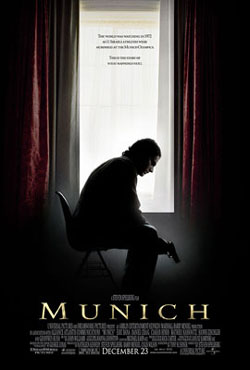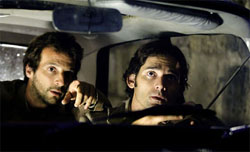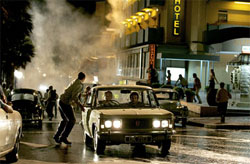And Justice for All: Spielberg's "Munich"
 |
“Every civilization finds it necessary to negotiate compromises with its own values.”
-- Golda Meir, Munich
What defines a Steven Spielberg film, exactly? Maybe it's not a question on every audience member's mind, but it's useful to think about it a bit, since he is America's most popular filmmaker over the past quarter-century, even with well-intentioned flops (Amistad) and ill-advised detours (Always). It might also help explain the polarizing effect of his latest opus, Munich (we won't address Mossad's grousing about the film -- secret services are obligated to be unhappy about everything).
Common wisdom states that there are two Spielbergs. One is the entertainer who aims to please and has done so with fun-house classics such as Jaws and Raiders of the Lost Ark (Jurassic Park too, if you're in a charitable mood). This Spielberg has the brio of the wide-eyed youngster seduced by cinema itself, with a maestro's command over his audience. Unspooling setpieces and jacking up tension with wit and verve, his influence is plain to see on nearly every popular film director today, from Peter Jackson to John Woo. The other Spielberg is the socially aware one, committed to educating the public on everything from slavery to the Holocaust, and throwing together an uneven string of sometimes potent and sometimes ponderous epics.
But the thread that ties these two Spielbergs together is his relentless humanism. His adventure films (at least, his best ones) stand out because they maintain a faith in old-fashioned pluck and common sense over superheroic talents and gleaming special effects, as well executed as the latter may be. One could argue that he has taken on the mantle of Frank Capra, adopting Capra's concerns with human folly and all-American decency -- with the added bonus of man-eating sharks and thrill-seeking archeologists. Likewise, Spielberg's "social conscience" movies are grounded in the belief that individuals can make a difference, that society can amount to something positive. Oftentimes this humanism tips over into sentimentality -- see the conclusions of the otherwise excellent and even ambivalent Schindler's List or Saving Private Ryan for evidence of that. Ironically enough, despite the director's best intentions, what stand out about his movies are the moments in which Spielberg the filmmaker takes over. When he is fully engaged with a premise or a particular setpiece, no one has a surer handle on the art of cinema, and no one is more fluid with pace and camera movement, or coaxing adroit performances from his actors.
 Some have heralded Munich as a synthesis of the two Spielbergs, as he melds a earnest message about violence and retribution with a sleek men-on-a-mission plot. Based on the novel Vengeance by George Jonas, the film has received much attention for its depiction (or misrepresentation, depending on who you ask) of spies, terrorists, and the Israel-Palestine question. Those who take Spielberg to task for humanizing terrorists or neglecting the pain of the Palestinians are not necessarily missing the point, but are failing to take into account that this is not a truthful, accurate account of what happens after the 1972 Olympics in Munich, nor does it claim to be (in any case, finding a singular "truth" about Israel and Palestine seems a hopeless task). This is an artist's take on the subject, representing his view of the world. As such, to dismiss it as propaganda or being inaccurate is to deny its purpose -- to foster debate and yes, disagreement. I am reminded of James Agee's famous statement: "It is my business to conduct one end of a conversation, as an amateur critic among amateur critics. And I will be of use and of interest only in so far as my amateur judgment is sound, stimulating, or illuminating." When Spielberg the filmmaker tackles the charged subjects he does in Munich, it behooves us to conduct our end of the conversation.
Some have heralded Munich as a synthesis of the two Spielbergs, as he melds a earnest message about violence and retribution with a sleek men-on-a-mission plot. Based on the novel Vengeance by George Jonas, the film has received much attention for its depiction (or misrepresentation, depending on who you ask) of spies, terrorists, and the Israel-Palestine question. Those who take Spielberg to task for humanizing terrorists or neglecting the pain of the Palestinians are not necessarily missing the point, but are failing to take into account that this is not a truthful, accurate account of what happens after the 1972 Olympics in Munich, nor does it claim to be (in any case, finding a singular "truth" about Israel and Palestine seems a hopeless task). This is an artist's take on the subject, representing his view of the world. As such, to dismiss it as propaganda or being inaccurate is to deny its purpose -- to foster debate and yes, disagreement. I am reminded of James Agee's famous statement: "It is my business to conduct one end of a conversation, as an amateur critic among amateur critics. And I will be of use and of interest only in so far as my amateur judgment is sound, stimulating, or illuminating." When Spielberg the filmmaker tackles the charged subjects he does in Munich, it behooves us to conduct our end of the conversation.The most striking thing about this film -- as with latter-day Spielberg in general -- is that Spielberg the entertainer has given way to Spielberg the tribute artist. AI and Minority Report are his nods to Stanley Kubrick in both subject matter and tone, and they both reek of the friction between his innocent optimism and the icy, cynical hues of Kubrick. In execution, Munich salutes the paranoid throb and gritty naturalism of 70s conspiracy cinema, plus the stylings of Godfather-era Francis Ford Coppola. After a superbly eerie opening that recreates the drama and tragedy of the kidnapping and murder of 11 Israeli athletes by the Palestinian terrorist group Black September at the Munich Olympics, our attention shifts to Mossad officer Avner (Eric Bana), who is recruited directly by Prime Minster Golda Meir herself (Lynn Cohen is tasked with voicing connect-the-dots epigrams like the one that begins this review) to assassinate 11 terrorists, all of whom allegedly have ties to Black September, and the Munich massacre. Under the cantankerous eye of his case officer Ephraim (Geoffrey Rush), Avner and his hand-picked squad jet across Europe seeking their targets, mixing it up with shady informants, and engaging in bloody bits of business by gun or bomb. Inevitably, each killing becomes more difficult, as circumstances, innocent victims, unforeseen enemies, and the men's own consciences catch up to them.
 As a premise, this is a canny elaboration on true events (Mossad agents did spend years after Munich selectively taking out Palestinian terrorists), and Spielberg, who is at his best in concocting action scenes, spares no expense in adding colorful touches to the bloodletting. The first murder is vintage Coppola, with its coldly hysterical point of view and telling details (the victim collapses on top of wine and milk bottles, red and white mixing indiscriminately). Another sequence involving a booby-trapped phone and an innocent girl is a masterful riff of spatial logic, camera angles, and Hitchcockian suspense. Other assassinations are more brutal, with a clinical perspective that intensifies the horror. Between this and A History of Violence, 2005 might well be remembered as the year of the feel-bad vengeance movie. Filmed in muted colors by frequent collaborator Janusz Kaminski, this is a more shadowy, metallic film than any Spielberg has produced up to now.
As a premise, this is a canny elaboration on true events (Mossad agents did spend years after Munich selectively taking out Palestinian terrorists), and Spielberg, who is at his best in concocting action scenes, spares no expense in adding colorful touches to the bloodletting. The first murder is vintage Coppola, with its coldly hysterical point of view and telling details (the victim collapses on top of wine and milk bottles, red and white mixing indiscriminately). Another sequence involving a booby-trapped phone and an innocent girl is a masterful riff of spatial logic, camera angles, and Hitchcockian suspense. Other assassinations are more brutal, with a clinical perspective that intensifies the horror. Between this and A History of Violence, 2005 might well be remembered as the year of the feel-bad vengeance movie. Filmed in muted colors by frequent collaborator Janusz Kaminski, this is a more shadowy, metallic film than any Spielberg has produced up to now. But whither Spielberg, the humanist? He is present, in full glory, for Avner is not only a good soldier, but a conflicted father who misses his faithful wife and daughter even as he carries out his increasingly shady duty. For the most part, his targets are well-spoken, professorial, seemingly likeable types, which is meant to increase our queasiness at their deaths, and the moral quandaries escalate when they are replaced by more ruthless successors. Continuing in the vein of Spielberg movies with absent fathers, Avner finds himself stranded between two surrogate papas -- Ephraim, the nagging voice of country and loyalty who nevertheless denies Avner's very existence (so as to better complete his mission), and the Vito Corleone-like leader (Michael Lonsdale) of a French network of informants who aid Avner (but may also be selling him out to the enemy -- oh, those tricky French). The film's heart resides in the first meeting between Bana and Lonsdale; they both cook together for a family party in the latter's French countryside manor, in a scene that harkens to The Godfather's moments of bustling gaeity, even as it torpedoes the conceit with a blasphemous prayer at the dinner table. The killer and the informant gain an appreciation for each other ("butcher's hands, gentle souls"), as well as an understanding of their devotion to something more substantial than doctrine or nation: family. In the end, Spielberg's hero opts for family over country, as Avner finds himself estranged from Israel, unsure if he is targeted for assassination himself, and flees to Brooklyn with his brood. But even this is relative happiness compared to most films of this ilk -- Spielberg wants to recapture the bulging paranoia and mistrust of authority that informs the great 70s conspiracy thrillers such as Three Days of the Condor, but he is too warm and fuzzy a director to emulate those films' mounting terror.
But whither Spielberg, the humanist? He is present, in full glory, for Avner is not only a good soldier, but a conflicted father who misses his faithful wife and daughter even as he carries out his increasingly shady duty. For the most part, his targets are well-spoken, professorial, seemingly likeable types, which is meant to increase our queasiness at their deaths, and the moral quandaries escalate when they are replaced by more ruthless successors. Continuing in the vein of Spielberg movies with absent fathers, Avner finds himself stranded between two surrogate papas -- Ephraim, the nagging voice of country and loyalty who nevertheless denies Avner's very existence (so as to better complete his mission), and the Vito Corleone-like leader (Michael Lonsdale) of a French network of informants who aid Avner (but may also be selling him out to the enemy -- oh, those tricky French). The film's heart resides in the first meeting between Bana and Lonsdale; they both cook together for a family party in the latter's French countryside manor, in a scene that harkens to The Godfather's moments of bustling gaeity, even as it torpedoes the conceit with a blasphemous prayer at the dinner table. The killer and the informant gain an appreciation for each other ("butcher's hands, gentle souls"), as well as an understanding of their devotion to something more substantial than doctrine or nation: family. In the end, Spielberg's hero opts for family over country, as Avner finds himself estranged from Israel, unsure if he is targeted for assassination himself, and flees to Brooklyn with his brood. But even this is relative happiness compared to most films of this ilk -- Spielberg wants to recapture the bulging paranoia and mistrust of authority that informs the great 70s conspiracy thrillers such as Three Days of the Condor, but he is too warm and fuzzy a director to emulate those films' mounting terror.It is a fascinating dichotomy, this clash between the trademark Spielberg humanism and the dirty work that his men do, and the inability to reconcile these polar opposites. When the characters slow down to discuss their moral quandaries, the film flounders a bit. In a brave move, Avner and his associates -- including the feisty getaway driver Steve (Daniel Craig), the conflicted bomb maker Robert (Mathieu Kassovitz), level-headed forger Hans, and kvetchmeister clean-up man Carl (Ciarán Hinds) are presented at a remove, with a minimum of background, or the typical cloying, "heartwarming" quirks. The actors perform with conviction, and Bana does a bang-up job navigating his character from calm command to frazzled paranoia, but this is foremost a movie about ideas, and thus the characters are mouthpieces rather than flesh and blood. Spielberg's heart may be in the right place, but he's not very subtle or elegant at presenting inner turmoil through dramatic interaction. To be frank, his particular world view seems a bit lacking for this material. It would be pleasing, perhaps, to believe that everyone is capable of decency and doubt -- it would also be counter to what we know about agents and terrorists. The climax of the film is as wrongheaded as you can get, as an agonized Avner strains for orgasm with his wife as images of the final Munich massacre flood his head (sex and death, get it?), although to be fair, Spielberg has never had a knack for killer conclusions to his tales. [An aside: it is interesting to note the incidence, or lack thereof, of sex in Spielberg's films, and its linkage to pain (i.e., Indiana Jones, Marion Crane, and a wayward mirror) -- perhaps it's only fitting, given the man-child perspective that graces most of his films.] Nevertheless, the force of his thesis -- the endless cycle of retribution, violence begeting violence -- comes through loud and clear, even if it's as blunt as a bomb blast.
The film's denouement, however, is genuinely fine (do not read on if you dislike spoilers). Avner and Ephraim have a final confrontation, and the wayward agent with a new, uncertain home in the New World resists the advances of the irritable Israeli with the absolute belief in nation and loyalty. Avner invites Ephraim to dinner; Ephraim refuses and departs. Many have decried Munich for its pacifist viewpoint, for suggesting that the only way to win the war on terror is to refrain from violence, but as we see a desolated Avner framed against the New York skyline, those Twin Towers in the distance, it is clear that Spielberg has no clear-cut answers. Violence reaches everywhere, from the streets of Europe to the skyscrapers of New York City, an unstoppable cycle of acts and counteracts, dispatched villains replaced with more villains. In such a setting, an individual act of courage, such as rejecting death and settling down with a family, seems more like a retreat than a solution. It is perhaps the most ambiguous end to a Spielberg film yet -- and indicates that the humanist and the entertainer with a social conscience may yet find some complex middle ground.


1 Comments:
I'm not much of a Spielberg fan, but you've made me determined to see this one! And thanks to Jonathan Jackson for the link to your blog, which I now intend to read regularly.
Post a Comment
<< Home